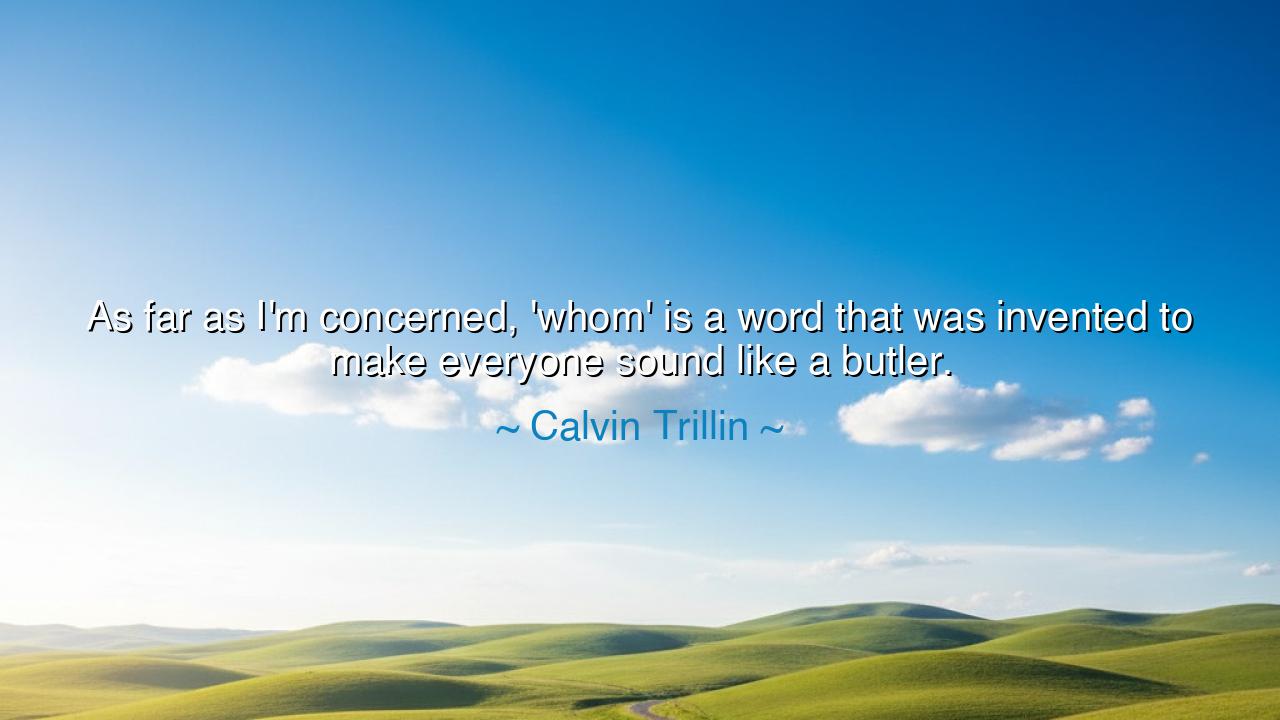
As far as I'm concerned, 'whom' is a word that was invented to
As far as I'm concerned, 'whom' is a word that was invented to make everyone sound like a butler.






In the realm of language, there are words that transcend their humble roles and gain a weight, a formality, that makes them seem like more than what they truly are. One such word, as the wise observer Calvin Trillin aptly pointed out, is the word “whom”. Trillin’s playful yet poignant remark, “As far as I’m concerned, ‘whom’ is a word that was invented to make everyone sound like a butler,” speaks not only to the nature of language but to the very essence of communication itself. It is a truth as old as civilization: that words, in their beauty, can sometimes become barriers, standing between the speaker and the listener in a way that feels more like obligation than expression.
In the ancient times, the Greek philosophers sought to understand the true nature of communication—what it meant to convey truth and meaning through words. The philosopher Socrates, in his dialogues, often questioned the very foundations of the language used by his peers, seeking to strip away the unnecessary formalities that clouded true understanding. Much like Socrates, Trillin's observation reveals that the formality of certain words, such as “whom”, can sometimes overshadow the true essence of communication. Language, in its pursuit of precision, can sometimes lose its soul, becoming a tool of pretense rather than a bridge of understanding.
Consider, for a moment, the ancient Romans, masters of oration and rhetoric, who shaped the very fabric of how we communicate. They knew well the power of words to persuade, to move, and to unite. Yet they also understood that language must remain authentic and approachable to connect the hearts and minds of the people. If a word becomes too stiff, too formal, it risks losing its power to move and to inspire. This is the heart of Trillin's message—language should be a tool of connection, not a tool of distinction that sets one apart from another. Just as the Romans spoke of their people, with commonness and dignity, so too should we allow our words to flow naturally, without the heavy hand of elitism.
Throughout history, we find examples of individuals who, in their pursuit of eloquence, have sometimes forgotten the very spirit of communication. King Louis XIV of France, known for his grandiosity and formal speech, often surrounded himself with courtiers who echoed his pomp and circumstance, reinforcing a system where language became a means of maintaining hierarchy. Yet in the quieter corners of the world, away from the palaces, language was often spoken in a manner far more direct, far more honest, a reflection of the soul rather than a mask of status. Trillin’s words remind us that the desire to be understood does not always need to be clothed in the robes of formality.
The idea that “whom” was invented to make one sound like a butler touches on a deeper human truth—that language, in its effort to be precise, can sometimes betray its purpose. To speak in a way that is relatable, genuine, and human is to embrace the full power of language, not to use it as a vehicle of separation. Trillin’s quip invites us to embrace simplicity, to let our words be a reflection of who we truly are, not of who we believe we must appear to be. In a world where language can often become a tool of division, we must remember that words are meant to bring us together, to facilitate understanding, not to elevate one above another.
As we reflect on Trillin’s words, we are reminded of the teachings of the ancient poets, who wrote with grace and simplicity, never allowing their words to become encumbered by excess. Homer, in his epic poems, spoke of the struggles and triumphs of the human spirit not through fancy words, but through the raw emotions that connected all of humanity. His words are remembered not because they were filled with complex grammar, but because they spoke to the core of human experience. Just as Homer’s poetry transcends time, so too should our words. They should be vehicles of connection, not tools of pretense.
And so, the lesson of Trillin’s quote is clear: do not allow the formality of language to overshadow its true purpose. In your conversations, in your written words, let your speech be honest and approachable, for it is only through simplicity and clarity that true understanding can be achieved. The ancient sages knew that words are not meant to serve as barriers, but as bridges to the heart. Language is a tool to express our shared humanity, and when used in its most natural form, it is the most powerful tool we have to unite, to teach, and to inspire. So, the next time you are tempted to use a word like “whom”, remember that sometimes, simplicity is the true path to wisdom. Let your words be free, and let them bring you closer to the hearts of those who hear them.






AAdministratorAdministrator
Welcome, honored guests. Please leave a comment, we will respond soon